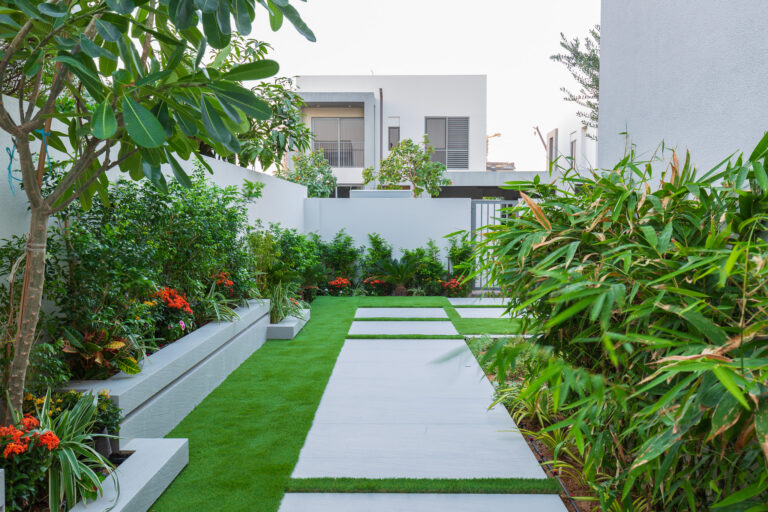Embracing nature’s tranquility has become a priority in modern garden design. As we seek solace from the bustling world, creating harmonious outdoor spaces that blend seamlessly with the landscape is crucial. In 2024, garden designers are reimagining landscapes that celebrate sustainability, biodiversity, and personal wellbeing.
This article explores the latest trends in garden design, from water-wise landscaping and climate-adaptive gardening to integrating outdoor living spaces that foster mindfulness. We’ll also introduce our esteemed Dubai-based company, Panamera Landscapes & Pools, renowned for their expertise in crafting exquisite garden sanctuaries tailored to each client’s unique vision.
Embracing Nature’s Resilience
Naturalistic Planting and the New Perennial Movement
We are witnessing a resurgence of naturalistic planting, a gardening style that mimics the beauty and functionality of natural ecosystems. At its core, this movement promotes biodiversity by incorporating native and non-native species that support pollinators and wildlife. These gardens require minimal maintenance, water, and fertilizers, making them sustainable and eco-friendly.
The New Perennial Movement, pioneered by landscape designer Piet Oudolf, has gained momentum worldwide. It reimagines gardens as dynamic compositions celebrating perennial plants in their natural setting. Plant selection prioritizes visual appeal, ecological value, and climate adaptability, creating a sense of structured chaos that evolves throughout the seasons.
Rewilding and Sustainable Gardening Practices
Rewilding encourages a holistic approach to landscapes, focusing on how each plant impacts multiple levels of the ecosystem. By using native plants and habitat-building practices, our gardens become oases for pollinators, small animals, and predators, creating interconnected natural spaces. While rewilding shares similarities with ecological restoration, it is more adaptable to urban environments.
Sustainable gardening practices like composting, water-efficient irrigation, and integrated pest management reduce our environmental impact. Embracing imperfections and allowing gardens to evolve naturally contribute to the authenticity of a rewilded space.
Creating Wildlife Havens
Incorporating elements that attract and support local wildlife is crucial for a thriving garden ecosystem. Native plants, bird feeders, birdbaths, and bee-friendly plants create habitats for pollinators and other creatures, adding depth and vitality to our gardens. Letting grass grow longer and minimizing lawn areas provide shelter for amphibians and small mammals, fostering biodiversity.
Water-Wise and Climate-Adaptive Gardening
Xeriscaping and Drought-Tolerant Plants
We are embracing xeriscaping, a landscaping approach that emphasizes water conservation by incorporating drought-tolerant plants. By selecting species adapted to arid conditions, we can create visually appealing gardens that thrive with minimal water usage. Colorful, low-maintenance plants like fernbush, Corsican violet, and Western sand cherry add vibrant hues while reducing our reliance on excessive irrigation.
Rain Gardens and Water Conservation
Innovative techniques like rain gardens are gaining popularity as we strive to maximize water efficiency. These shallow depressions collect and store rainwater runoff, allowing it to slowly percolate into the soil, reducing the need for frequent watering. By channeling rainwater into swales and planting moisture-loving species in these areas, we can create self-sustaining micro-ecosystems within our gardens.
Adapting to Changing Weather Patterns
As climate patterns shift, our gardens must adapt to survive prolonged droughts, intense heat waves, and unpredictable rainfall. We are carefully selecting plants with resilient traits that enable them to thrive in diverse conditions, from extended dry spells to periods of excessive moisture. Implementing strategies like rainwater harvesting, greywater recycling, and mulching helps us conserve precious water resources while maintaining lush, vibrant landscapes.
Integrating Outdoor Living Spaces
We are witnessing a shift towards integrating outdoor living spaces that seamlessly blend with nature, fostering a harmonious connection between our homes and the surrounding environment. This trend encompasses three key elements: outdoor rooms and entertaining areas, wellness gardens for mindfulness, and multifunctional greenhouses and sheds.
Outdoor Rooms and Entertaining Areas
Outdoor living rooms are becoming increasingly popular, designed to offer the same comfort and style as indoor spaces. These areas feature upholstered seating, coffee tables, rugs, and even outdoor fireplaces or heating solutions for year-round use. With advancements in weather-resistant materials and fabrics, these spaces can withstand the elements while providing a cozy, inviting atmosphere. Modular furniture systems allow for customization and adaptability, catering to various outdoor settings and entertaining needs.
Wellness Gardens for Mindfulness
Embracing the concept of wellness, gardens are being designed to promote physical and mental well-being. Yoga platforms, meditation corners, and outdoor spa areas are seamlessly integrated into the landscape, creating serene havens for rejuvenation. The inclusion of sensory elements like fragrant plants, soothing water features, and tactile textures enhances the mindfulness experience, fostering a deeper connection with nature.
Multifunctional Greenhouses and Sheds
Greenhouses are becoming versatile structures, perfect for early spring gardening and extending the growing season. They also serve as inspiring green design spaces, blurring the lines between indoor and outdoor living. Similarly, sheds are evolving into multifunctional retreats, offering opportunities for creative pursuits, relaxation, or even small-scale urban farming.
Conclusion
The modern gardening landscape is undergoing a transformative evolution, embracing sustainability, biodiversity, and personal well-being. As we navigate the challenges posed by climate change and urbanization, our gardens have become sanctuaries that harmonize with the natural world. The trends we’ve explored, from naturalistic planting and rewilding to water-wise techniques and climate-adaptive gardening, offer a roadmap for creating resilient, eco-conscious outdoor spaces that foster a deeper connection with nature.
At the forefront of this movement is Panamera Landscapes & Pools, a renowned Dubai-based company with a vast client base, dedicated to crafting exquisite garden sanctuaries tailored to each client’s unique vision. Contact us to elevate your outdoor living experience and embark on a journey of embracing nature’s tranquility in your modern garden oasis.



